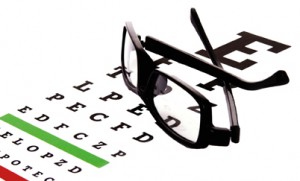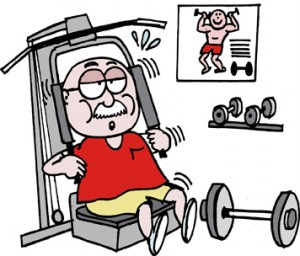Restore Near Vision w/o Glasses? + Free Seminars
Posted on May 28, 2013 by bob in NewsUCanUse
After a Stroke, Every Minute Counts
From the moment a person starts to experience stroke symptoms, the clock starts ticking. Every minute that passes can make a difference in how well their brain, arms, legs, speech or thinking ability recover. Now, new national guidelines for stroke treatment make it clear just how much minutes count. The American Stroke Association guidelines are published in the American Heart Association journal Stroke. Here are some key numbers:
90% – the proportion of stroke victims whose symptoms are caused by clots blocking blood vessels in the brain, making them potential candidates for clot-busting therapy if they get to the hospital in time.
9-1-1 – the number that people should call immediately after they or someone near them begins to experience symptoms of stroke.
4.5 hours – the maximum number of hours that can pass between the start of stroke symptoms and the start of clot-dissolving treatment (called tPA).
2 million – The approximate number of brain cells (neurons) lost for each minute delay in restoring blood flow after a stroke. Earlier treatment is better.
60 – the number of minutes between the moment a typical stroke victim reaches a hospital, and the moment they get treatment to break up a blood clot in their brain. This “door to needle time” includes the time it takes to use brain scanners to tell whether a clot or bleeding is causing the stroke.
4 – the number of letters in the word “FAST,” which is an easy way to remember the sudden signs of a stroke:
— Face drooping: Does one side of the face droop or is it numb?
— Arm weakness: Is one arm weak or numb?
— Speech difficulty: Is speech slurred, are you unable to speak, or are you hard to understand?
— Time to call 9-1-1: If you have any of these symptoms, even if the symptoms go away, call 9-1-1 and get to the hospital immediately.
 New Technique Shows Promise in Restoring Near Vision without Glasses
New Technique Shows Promise in Restoring Near Vision without Glasses
By middle age, most people have age-related declines in near vision (presbyopia) requiring bifocals or reading glasses. An emerging technique called hyperopic orthokeratology (OK) may provide a new alternative for restoring near vision without the need for glasses, according to a study performed at the University of New South Wales, Sydney and appearing in Optometry and Vision Science.
For middle-aged patients with presbyopia, researchers have shown the feasibility of correcting one eye for near vision through OK, in which overnight contact lens wear shapes the cornea of one eye to allow in-focus near vision for reading. To preserve normal distance vision, the other eye is left untreated. Presbyopia is caused by age-related loss of flexibility in the cornea.
Orthokeratology is a clinical technique to correct vision using specially designed rigid contact lenses to manipulate the shape of the cornea. Researchers liken OK therapy to orthodontic treatment using braces to change the alignment of the teeth.
The improvement was apparent on the first day after overnight OK lens wear, and increased further during the initial treatment week. To retain the correction in near vision, patients had to continue wearing their OK lenses every night.
Green Tea Found to Reduce Some GI Cancers 
Women who drink green tea may lower their risk of developing some digestive system cancers, especially cancers of the stomach/esophagus and colorectum, according to a study led by researchers from Vanderbilt-Ingram Cancer Center and published online in American Journal of Clinical Nutrition.
Researchers found that regular tea consumption, defined as tea consumption at least three times a week for more than six months, was associated with a 17% reduced risk of all digestive cancers combined.
Those who consumed about two to three cups per day had a 21% reduced risk of digestive system cancers. The risk was reduced by 27% among women who had been drinking tea regularly for at least 20 years. For colorectal cancer, risk was reduced by 29% among the long-term tea drinkers. Tea contains polyphenols or natural chemicals that include catechins. Catechins have antioxidant properties and may inhibit cancer by reducing DNA damage and blocking tumor cell growth and invasion.
 Sport Makes Middle-Aged People Smarter
Sport Makes Middle-Aged People Smarter
High-intensity interval training makes middle-aged people not only healthier but smarter, showed a Montreal Heart Institute (MHI) study, in collaboration with the Montreal Geriatric University Institute.
The participants were all overweight and had one or more other cardiovascular risk factors. They followed a four-month program of twice weekly interval training on stationary bicycles and twice weekly resistance training.
High-intensity interval training involves alternating between short periods of low and high intensity aerobic exercise – for example, a series of 30 seconds of sprinting followed by 30 seconds of walking or jogging. After the program was finished, researchers discovered that waist circumference and trunk fat mass had decreased.
They also found that the participant’s VO2max and insulin sensitivity had increased significantly, in tandem with their score on cognitive tests. Insulin sensitivity is the ability of sugar to enter body tissue. VO2max is the maximum capacity of an individual’s body to transport and use oxygen during exercise.
Looking Out for Seniors
The Alabama Silver-Haired Legislature, in partnership with Eastdale Estates, hosts a series of informational seminars aimed at keeping seniors safe and healthy. All programs are held at 10 a.m. at Eastdale Estates’ Activity Room, 5801 Eastdale Dr., Montgomery. For more information call Dr. John Bitter, 334-612-7624.
June 3 — Montgomery County Sheriff’s Dept
“Are You OK?” A program conducted by the department that telephones seniors who live alone to determine if they are alright, and to alert the appropriate person if they do not respond.
June 10 — Central Alabama Aging Consortium
An introduction to activities planned for World Elder Abuse Day to be held June 15, and how Montgomerians can get involved.
June 17 — Adult Protective Services
An explanation of services offered by the agency to insure the wellbeing of seniors.
June 24 — Attorney General’s Office
Assistant AG Monica Sheeley discusses financial scams that have robbed seniors of their money, and how you can protect yourself from scam artists.









